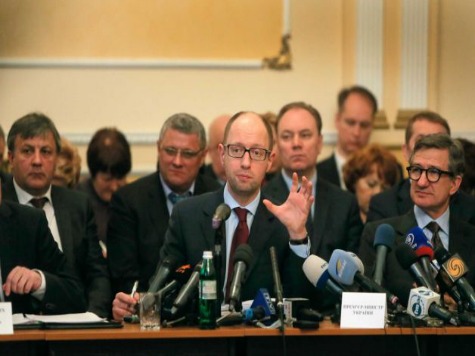Ukrainian Prime Minister Arseniy Yatsenyuk met with regional leaders in Kharkiv in an attempt to ease tensions between Kiev and east Ukraine. The people of the east, which is dominated by Russian speakers and ethnic Russians, are frustrated with Kiev because they believe the new government ignored their grievances after Russia-backed President Viktor Yanukovych was ousted in February.
According to leaders in east Ukraine, the residents just want the government to listen to their objections, and the pro-Russians responsible for the violence do not represent the majority of the residents. These leaders do not recognize the referendum held by a few cities in Donetsk Oblast, which led the separatists to declare independence from Ukraine, but told Yatsenyuk that Kiev should not ignore it:
“The referendum doesn’t have any legal consequences,” said Valery Holenko, chairman of the Luhansk regional government. “But it has expressed the will of the people, which cannot be discounted. People genuinely went en masse to the referendum. This was a protest vote.”
Yatsenyuk promised the leaders more local and decentralized powers. He also said the new constitution will address the Russian language since the majority in the east speak the language. After Yanukovych won in 2010, he passed a law that allowed cities and towns in the east to use Russian for education and official business tasks. However, Kiev immediately revoked the law when parliament ousted Yanukovych. The Kyiv Post reported:
“Ukrainian government remains committed to the idea of decentralization of power and is ready to ensure a special status for Russian and languages of national minorities,” Ukrainian Prime Minister Arseniy Yatseniuk has said.
“Our position is unchanged: we believe that the power needs to be decentralized. … The central authorities should have a government representative office, which will conduct the so-called general supervision over the observance of laws in the relevant territory,” he said during the second all-Ukrainian roundtable of national unity in Kharkiv on Saturday.
As regards the status of the Russian language and the languages of national minorities, the prime minister said: “Within the framework of the constitutional amendments, we believe that we are able to provide the special status for the Russian language and the languages of national minorities, and to allow each region to develop independently within a single state policy.”
This might not be enough: “Holenko said the devolution of powers that the government is offering is no longer enough and that as a first step in appeasing eastern Ukrainians the government has to stop the ‘anti-terrorist operation’ in the east.”
Interim President Oleksandr Turchynov started the “anti-terrorist operation” after pro-Russians refused to put down their weapons and evacuate the government buildings. Ukraine has given the pro-Russians many opportunities to end the standoff peacefully and will still grant amnesty to all who will surrender their weapons.
Yatsenyuk met with these leaders on April 11 and told them Kiev was ready to give the regions more power to control their own finances and economies. Ukraine is currently preparing to hold presidential elections on May 25.

COMMENTS
Please let us know if you're having issues with commenting.